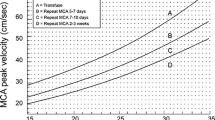Abstract
Aim
To determine the socio-demographic characteristics and pregnancy outcome of Rh D alloimmunized women monitored with MCA PSV (middle cerebral artery peak systolic velocity).
Materials and Methods
In total, 363 Rh D alloimmunized women attended antenatal clinic or obstetric emergency between January 2006 and December 2014. MCA PSV was the screening method for detection of fetal anemia. Intrauterine blood transfusion (IUT) was given when MCA PSV was > 1.5 MOM. Totally, 162 women (164 fetuses) received 492 transfusions. Forty-eight women had fetal hydrops at presentation. Five women (three received IUT) were lost to follow-up. Pregnancy outcome of 358 women and socio-demographic characteristics of 363 women were analyzed.
Results
The perinatal mortality was 421, 66 and 87 per 1000 live births in hydrops group, non-hydrops IUT group and non-IUT group, respectively.
Conclusion
Rh alloimmunization is still a major cause of perinatal morbidity and mortality. The higher gravidity, previous history of pregnancy wastage, still births and hydrops increase the requirement of intrauterine transfusion. MCA PSV is an excellent tool for monitoring of Rh alloimmunized pregnancies to detect fetal anemia. Early detection and monitoring by MCA PSV improve its outcome.

Similar content being viewed by others
References
Qureshi H, Massey E, Kirwan D, Davies T, et al. BSCH Guidelines for the use of anti-D immunoglobulin for the prevention of haemolytic disease of the fetus and newborn. Transfusion Medicine. 2014;24:8–20.
Pahuja S, Gupta SK, Pujani M, Jain M. The prevalence of irregular erythrocyte antibody among antenatal women in Delhi. Blood Transfus. 2011;9(4):388–93.
Mari G. For collaborative group for doppler assessment of the blood velocity in anaemic features noninvasive diagnosis by Doppler ultrasonography of fetal anaemia due to maternal red cell alloimmunization. N Engl J Med. 2000;342(1):9–14.
Giannina G, Moise KJ, Dorman K. A simple method to estimate volume of fetal intravascular transfusions. Fetal DiagTher. 1998;13:94–7.
Ziprusky A, Paul VK. The global burden of Rh disease. Arch Dis Child Neonatal Ed. 2011;96:F84-85.
Dadhwal V, Deka D, Sumana G, Mittal S, Paul VK, Deorari A. Treatment of fetal anaemia in Rh isoimmunized pregnancies with intra-uterine fetal blood transfusion. J ObstetGynecol India. 2010;60(2):135–40.
AL Joudi FS, Ahmed Al-Salib SA. Incidence of rhesus isoimmunization in rhesus negative mothers in Ramadi Iraq in mid 1990s. East Mediterr Health J. 2000;6(5–6):1122–5.
Oepkes D, Seaward PG, Vanderbusche FP, Diamond Study Group. Doppler ultrasonography versus amniocentesis to predict fetal anaemia. N Engl J Med. 2006;355(2):156–64.
Zimmermann R, Durig P, Carpenter RJ, Mari G. Longitudinal measurement of peak systolic velocity in the middle cerebral artery for monitoring pregnancies complicated by red cell alloimmunization: a prospective multicentre trial with intention to treat. BJOG. 2002;109(7):746–52.
Sau F, EL-Matary A, Newton L, Wieranmarch-Chi D. Management of red cell alloimmunized pregnancies using conventional methods compared with that of middle cerebral artery peak systolic velocity. Acta Obstet Gynecol Scand. 2009;88(4):475–8.
Garrabedian C, Vaast P, Behal H, et al. Management of severe fetal anaemia by Doppler measurement of middle cerebral artery: are there other benefits than reducing invasive procedures? Eur J Obstet Gynecol Reprod Biol. 2015;192:27–30.
Van Kamp IL, Klumper FJCM, Oepkes D, Scherjon SA, Kanhai HHH. Treatment of fetal anaemia due to red cell alloimmunization with intra uterine transfusions in the Netherlands 1989–1999. Acta Obstet Gynecol Scand. 2004;83(8):731–7.
Van Kamp IL, Klumper FJCM, Bakkum RSLA, et al. The severity of immune fetal hydrops is predictive of fetal outcome after intra uterine treatment. Am J Obstet Gynecol. 2001;185:668–73.
Van Kamp IL, Klumper FJCM, Oepkes D, et al. Complications of intrauterine intravascular transfusion for fetal anemia due to maternal red cell alloimmunization. Am J Obstet Gynecol. 2005;192(1):171–7.
Pasman SA, Claes L, Lewi L, et al. Intrauterine transfusion for fetal anemia due to red blood cell alloimmunization: 14 years’ experience in Leuven. Facts Views Vis OBGYN. 2015;7(2):129–36.
Bhutani VK, Zipursky A, Blencowe H, Khanna R, et al. Neonatal hyperbilirubinemia and Rhesus disease of the newborn: incidence and impairment estimates for 2010 at regional and global levels. Pediatr Res. 2013;74(1):86–100.
Funding
None.
Author information
Authors and Affiliations
Corresponding author
Ethics declarations
Conflict of interest
There is no conflict of interest in connection with this article.
Additional information
Publisher's Note
Springer Nature remains neutral with regard to jurisdictional claims in published maps and institutional affiliations.
Dr. Subhas Chandra Saha is a Professor MD, Departments of Obstetrics and Gynaecology, Postgraduate Institute of Medical Education and Research, Sector 12, Chandigarh, 160012, India; Dr. Rakhi Rai is an Ex Assistant Professor MS, Departments of Obstetrics and Gynaecology, Postgraduate Institute of Medical Education and Research, Sector 12, Chandigarh, 160012, India; Dr. Rashmi Bagga is a Professor MD, Departments of Obstetrics and Gynaecology, Postgraduate Institute of Medical Education and Research, Sector 12, Chandigarh, 160012, India; Dr. Ashish Jain is an Additional Professor MD, Department of Transfusion Medicine, Postgraduate Institute of Medical Education and Research, Sector 12, Chandigarh, India; Dr. Kanya Mukhopadhyay is a Professor MD, Department of Pediatrics, Postgraduate Institute of Medical Education and Research, Sector 12, Chandigarh, India; Dr. Praveen Kumar is a Professor MD, Department of Pediatrics, Postgraduate Institute of Medical Education and Research, Sector 12, Chandigarh, India
Rights and permissions
About this article
Cite this article
Saha, S.C., Rai, R., Bagga, R. et al. Pregnancy Outcome of Rh D Alloimmunized Pregnancies: A Tertiary Care Institute Experience of a Developing Country. J Obstet Gynecol India 71, 583–590 (2021). https://doi.org/10.1007/s13224-021-01455-4
Received:
Accepted:
Published:
Issue Date:
DOI: https://doi.org/10.1007/s13224-021-01455-4




